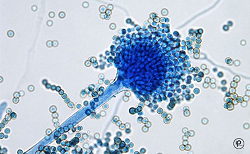Description:
Every day we inhale hundreds of fungal spores but these in healthy individuals are efficiently eliminated by specialist immune cells called phagocytes which engulf and kill them. However, some human illnesses interfere with this defence mechanism, increasing susceptibility to fungal diseases.
A specialist lung tissue called the epithelium is the first line of contact between the inhaled spores and us, the host. We are working to understand how the lung epithelium interacts with the spores of a common mould called Aspergillus fumigatus.
We have generated fluorescent Aspergillus and combined this with fungal and host specific dyes to directly visulaise this interaction. We have discovered that epithelial cells ingest fungal spores and kill them.
This might provide a critical defence mechanism which is acting while we breathe, and before even phagocytes arrive at the site of the infection.
We are now trying to work out how epithelial cells grab and ingest fungal spores, by using fluorescent fungal mutants and targeted elimination of host proteins.
Once we understand this process in detail we can design new therapies to assist a quicker elimination of the dangerous fungal spores we all inhale on a daily basis.
Dr Margherita Bertuzzi works in Dr Elaine Bignell’s lab at the University of Manchester
Medical and Patient education videos
-
Title
Description
-

Stanford big data techno-optimist and internist Russ Altman shows us how the power of machine learning in drug development is helping us understand adverse medication effects.
-

Psychiatrist and addiction expert Judson Brewer shares groundbreaking research on the mechanism of mindfulness practices that effectively help quell cravings of all kinds, including smoking.
-

Global public health worker and communications expert Christine McNab illuminates the story of how she combined her passions and partnered with the Gates Foundation to create what might be the most artistically crafted vaccine promotion campaign ever.
-

At 37 years old, physician, public health advocate, entrepreneur and grassroots organizer Vivek Murthy is one of the youngest U.S. Surgeon Generals in our nation’s history, and the first one of Indian descent. Prior to his confirmation, he was a physician at Brigham and Women’s Hospital and a Hospitalist Attending and Instructor in Medicine at Harvard Medical School. He was President and cofounder of Doctors for America, a national grassroots organization of 15,000 medical students and physicians advocating for high-quality and equitable health care.
-

Who knows better how to heal a community than those who inhabit it? America Bracho’s Latino Health Access trains local promotoras to teach neighbors and friends how to be healthy.
-

The state of your mind might be dependent on the state of your gut
-

Using soil fungi to combat livestock parasites in Australia. Ugandan smallholder dairy farmers show signs of comeback. New systems of aquaculture to benefit fish farmers in Thailand.
Fungi Can Combat Livestock Parasites
BBC World Service 1996
-

The rice blast fungus genome has been sequenced and will be used to develop resistant strains of rice. Nasa’s Spitzer telescope has found an asteroid around a sun like our own – but are there planets, too? As the hurricane seasons approaches in Amercia, scientists are trying to predict how bad it will be. Why “don’t worry, be happy” is practical medical advice.
-

In a few years, 70 million trees could be lost in the UK to ash dieback. Kew Gardens scientists are collecting samples from infected trees, to understand whether genes in ash may harbour resistance to the disease.
-

UK Fungus Day
October 12th is UK Fungus Day, a chance for us to celebrate these cryptic, often microscopic, but essential organisms. Usually hidden away inside plants or in soil (or if you’re unlucky, in between your toes), fungi have largely been growing below scientists’ radars for centuries. Mycologists still don’t know anything close to the true number of fungi that exist on the planet. About a hundred thousand have been formally identified, but it’s estimated that anywhere from half a million to ten million species may exist. This dwarfs, by several orders of magnitude, how many mammals there are on Earth. And, increasingly, we’re realising quite how crucial fungi are to the functioning of our ecosystems. Head of Mycology at The Royal Botanic Gardens Kew, Bryn Dentinger, explains how valuable fungi really are.Nobel Prizes 2014; Gauge; Genetics and Diabetes; UK Fungus Day
BBC Radio 4 2014
